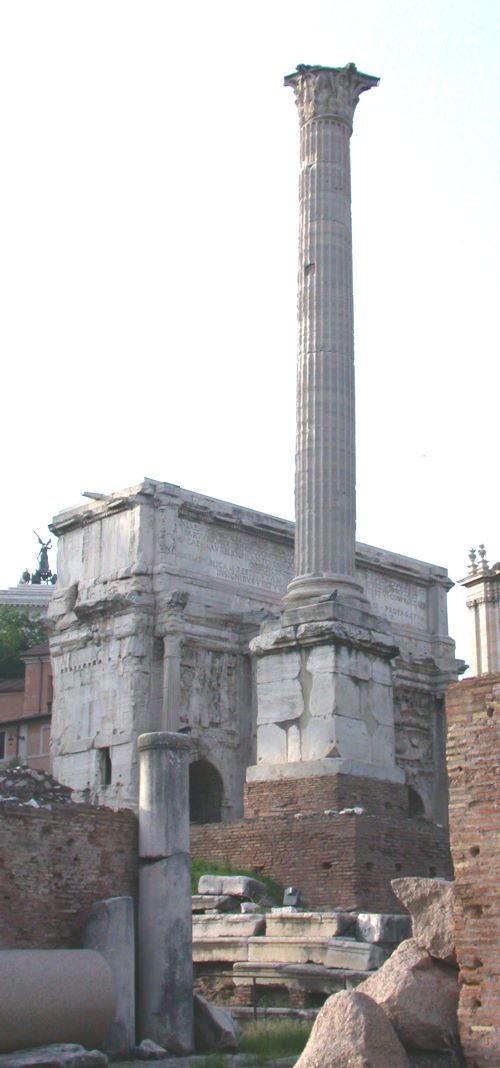The Column of Phocas is a Roman monumental column in the Roman Forum of Rome, Italy, built when Rome was part of the Eastern Roman Empire after reconquest from the Kingdom of the Ostrogoths.
Erected in front of the Rostra and dedicated or rededicated in honour of the Eastern Roman Emperor Phocas on August 1, 608 AD, it was the last addition made to the Forum Romanum. The fluted Corinthian column stands 13.6 m (44 ft) tall on its cubical white marble socle. On stylistic grounds, the column seems to have been made in the 2nd century for an unknown structure, and then recycled for the present monument. Likewise, the socle was recycled from its original use supporting a statue dedicated to Diocletian; the former inscription was chiselled away to provide a space for the later text.
The base of the column was uncovered in 1813, and the inscription is in Latin. The English translation is as follows:
- To the best, most clement and pious ruler, our lord Phocas the perpetual emperor, crowned by God, the forever august triumphator, did Smaragdus, former praepositus sacri palatii and patricius and Exarch of Italy, devoted to His Clemency for the innumerable benefactions of His Piousness and for the peace acquired for Italy and its freedom preserved, this statue of His Majesty, blinking from the splendor of gold here on this tallest column for his eternal glory erect and dedicate, on the first day of the month of August, in the eleventh indiction in the fifth year after the consulate of His Piousness.
The precise occasion for this signal honour is unknown, though Phocas had formally donated the Pantheon to Pope Boniface IV, who rededicated it to all the martyrs and Mary (Sancta Maria ad Martyres).
Atop the column's capital was erected by Smaragdus, the Exarch of Ravenna, a "dazzling" gilded statue of Phocas (which probably only briefly stood there).
Rather than a demonstration to mark papal gratitude as it is sometimes casually declared to be, the gilded statue on its column was more likely an emblem of the imperial sovereignty over Rome, which was rapidly fading under pressure from the Lombards, and a personal mark of gratitude from Smaragdus, who had been recalled by Phocas from a long exile and was indebted to the Emperor for retrieving his position of power at Ravenna.
In October 610, Phocas was overthrown and killed; his statues everywhere were overthrown.
Revolt against Phocas and Accession
The Emperor Maurice was murdered by Phocas at the harbor of Eutropius on 27 November 602. The deposed emperor was forced to watch his five younger sons executed before he was beheaded himself.
Empress Constantina and her three daughters were temporarily spared and sent to a monastery. The palace eunuch Scholasticus aided their escape to St. Sophia, but the church turned them over to Phocas, who sent them back to the monastery. A few years later, they were all executed at the harbor of Eutropius when Constantina was found guilty of a conspiracy against Phocas.
Phocas was widely regarded as an incompetent leader, by both much of the ruling class and army.
In 608, Heraclius the Elder renounced his loyalty to the Emperor Phocas, who had overthrown Maurice six years earlier. The rebels issued coins showing both Heraclii dressed as consuls, though neither of them explicitly claimed the imperial title at this time.
Heraclius the Elder, the Exarch of Carthage, began to prepare to invade, by cutting off the supply of grain to Constantinople and assembling a large army and navy.
Heraclius's younger cousin Nicetas launched an overland invasion from Carthage into Egypt; by 609, he had defeated Phocas's general Bonosus and secured the province. Meanwhile, the younger Heraclius sailed eastward with another force via Sicily and Cyprus.
As he approached Constantinople, he made contact with prominent leaders and planned an attack to overthrow aristocrats in the city, and soon arranged a ceremony where he was crowned and acclaimed as Emperor.
When he reached the capital, the Excubitors, an elite Imperial Guard unit led by Phocas's son-in-law Priscus, deserted to Heraclius, and he entered the city without serious resistance.
When Heraclius captured Phocas, he asked him "Is this how you have ruled, wretch?" Phocas's reply—"And will you rule better?"—so enraged Heraclius that he beheaded Phocas on the spot.
He later had the genitalia removed from the body because Phocas had raped the wife of Photius, a powerful politician in the city.



No comments:
Post a Comment